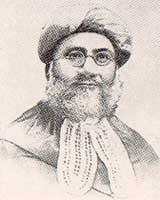|

|
Alphabetical Order
|

|
|
|
 TYABJI, BADRUDDIN (1844-1906). Born in Bombay to a prominent, wealthy, cosmopolitan, and modern-minded Muslim family, Badruddin studied law in England, becoming the first Indian barrister in Bombay in 1867, and was appointed a judge in 1895. He was known for his impartial implementation of justice, his ease with people from both East and West, and his high standard of living Tyabji founded the Anjuman-i-Islam of Bombay as a voluntary organization for the education, welfare, and social uplift of Muslims, men and women alike. He cooperated with various other social reformers working for similar emancipation of Hindu women from the veil, early marriage, and other social disabilities. In public affairs Tyabji worked with Pherozeshah Mehta, Kashinath Telang, and others in pressing for an elective council in the Bombay Municipal Corporation; they succeeded in 1871.
TYABJI, BADRUDDIN (1844-1906). Born in Bombay to a prominent, wealthy, cosmopolitan, and modern-minded Muslim family, Badruddin studied law in England, becoming the first Indian barrister in Bombay in 1867, and was appointed a judge in 1895. He was known for his impartial implementation of justice, his ease with people from both East and West, and his high standard of living Tyabji founded the Anjuman-i-Islam of Bombay as a voluntary organization for the education, welfare, and social uplift of Muslims, men and women alike. He cooperated with various other social reformers working for similar emancipation of Hindu women from the veil, early marriage, and other social disabilities. In public affairs Tyabji worked with Pherozeshah Mehta, Kashinath Telang, and others in pressing for an elective council in the Bombay Municipal Corporation; they succeeded in 1871.
Badruddin Tyabji, unlike another contemporary Muslim leader in northern India, Syed Ahmad Khan, supported the Indian National Congress fully. He was a delegate to its first session in 1885 and President of its third session in 1887. He and his descendants refuted the "two nation theory" that contributed to Partition and acted according to their belief in an all-India, secular, democratic, nationalist cause.
|




 TYABJI, BADRUDDIN (1844-1906). Born in Bombay to a prominent, wealthy, cosmopolitan, and modern-minded Muslim family, Badruddin studied law in England, becoming the first Indian barrister in Bombay in 1867, and was appointed a judge in 1895. He was known for his impartial implementation of justice, his ease with people from both East and West, and his high standard of living Tyabji founded the Anjuman-i-Islam of Bombay as a voluntary organization for the education, welfare, and social uplift of Muslims, men and women alike. He cooperated with various other social reformers working for similar emancipation of Hindu women from the veil, early marriage, and other social disabilities. In public affairs Tyabji worked with Pherozeshah Mehta, Kashinath Telang, and others in pressing for an elective council in the Bombay Municipal Corporation; they succeeded in 1871.
TYABJI, BADRUDDIN (1844-1906). Born in Bombay to a prominent, wealthy, cosmopolitan, and modern-minded Muslim family, Badruddin studied law in England, becoming the first Indian barrister in Bombay in 1867, and was appointed a judge in 1895. He was known for his impartial implementation of justice, his ease with people from both East and West, and his high standard of living Tyabji founded the Anjuman-i-Islam of Bombay as a voluntary organization for the education, welfare, and social uplift of Muslims, men and women alike. He cooperated with various other social reformers working for similar emancipation of Hindu women from the veil, early marriage, and other social disabilities. In public affairs Tyabji worked with Pherozeshah Mehta, Kashinath Telang, and others in pressing for an elective council in the Bombay Municipal Corporation; they succeeded in 1871.